|
.
Interviews
> Valda Marshall
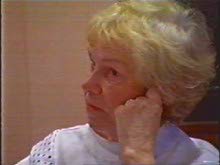 |
If
Anne Haddy was the on-screen matriarch of Neighbours,
Valda Marshall was the off-screen one. A well-known Australian
journalist in the 1950s, Valda was connected with Neighbours
from the very beginning, working alongside Reg Watson on the
early episodes on Channel Seven and staying with the series
through the height of its popularity until the early 1990s.
In this insightful and entertaining interview, Valda fondly
recounts a period of time that she considers one of the happiest
times of her professional life as a writer...
Can you give us a background on your career before Neighbours?
Before joining Neighbours I was a journalist/feature
writer/ TV columnist based in Sydney. I had been a TV critic
for a Sunday newspaper, the Sun-Herald, for 15 years when my
husband was transferred to New Zealand. Although I had to
give up my newspaper column, it turned out to be a window
of opportunity, as I then decided to put my money where my
mouth was and write for television instead of just watching
it. I had two TV plays (both comedies) produced in New Zealand,
and I have to say they weren’t very good. New Zealand was
just starting to produce its own television drama, and welcomed
any writer who was prepared to have a go at it. Later, in
our return to Oz, I had another TV play - also a comedy -
produced by the Australian Broadcasting Commission (now Corporation).
By this time, I had a better idea of what television writing
was all about.
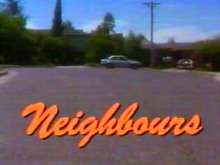 |
How
did you come to be involved with the development of Neighbours
in the lead-up to its debut on Channel 7?
I had decided that comedy writing was my forte, and started
bombarding production companies and networks with ideas and
scripts for sitcoms. Some of these landed on the desk of Penny
Fraser, secretary to the Grundy Organisation’s then head of
drama Reg Watson. She thought they were funny, and passed
them on to her boss. The next was a phone call asking me to
come in for an interview. I was a bit intimidated at first
but Reg was relaxed and friendly, questioning me on what I
thought of various shows, why I thought they’d worked or hadn’t
worked, the role of humour in television. He then gave me
some Neighbours scripts (10 had been written) to take
home and read before coming to a decision. It was one of those
situations where we were both sizing each other up: did I
like them, did they like me? All I’d been hoping for was the
chance to write an occasional script, but to my surprise when
I went back next day Reg offered me the job as Story Editor
on the show, which was to be launched in four months time.
It was offered on a trial basis of six weeks, and I started
the first week of November 1984. Nobody said anything at the
end of the six weeks, so I assumed I still had a job. I finished
up working at Grundy’s for 10 years.
Can
you share with us your experience of working with Reg Watson
on developing the series?
Most of the major characters for Neighbours had been
cast by the time I joined the show, but auditions were still
being held for the role of Daphne. Reg had very definite ideas
about the type of actress he wanted, one being that she should
not look like the stereotypical stripper. He believed in casting
against type (maybe one reason why the role of Max the plumber
was played by a Shakespearean actor). A young actress with
the face of an angel was an early favourite, but decided to
return home to New Zealand. The role of Daphne finally went
to Elaine Smith. One of the most important things for a Story
Editor is to understand what a show is all about, and get
inside its characters. Make them real people, to whom viewers
can relate. Reg told me that his inspiration for Neighbours
had been the Andy Hardy movies starring Mickey Rooney. He
liked the relationship between the young and brash Andy and
his father, Judge Hardy, wise and kindly guide and adviser
whenever Andy got into trouble. He was also a great fan of
the TV series Family Ties, with Michael J. Fox. This, I feel
is one of the reasons why Neighbours was so successful.
It was about different generations getting along together..
something most people can relate to. The Robinsons, in fact,
had three generations, with Jim’s mother-in-law Helen Daniels
as the much-loved family matriarch. When I started with the
show, my job was to create storylines for all the characters
as well as move the action along and create a dramatic cliffhanger
for the end of each episode. A daunting task. I had a sentimental
attachment at the time to my little portable Olivetti typewriter,
standby during all my years as a working journalist, so I’d
bring it on the bus each day to Grundy House in Artarmon,
Sydney. On my little portable I would churn out story material
for five episodes a week, which would then (after final approval
by Reg at a story conference) be passed on to outside writers
to construct into scenes and dialogue. I shared an office
with the Script Editor, a former actor being trained by Reg
to edit scripts. He had a disconcerting habit of striding
up and down the room, stopwatch in hand, acting out each scene
aloud. He had one of those strong, carrying actor voices,
and every now and then someone passingby would glance into
the room with a look of alarm, wondering what was happening
in there. Eventually, someone quietly took my colleague aside
and explained that script editors usually do their timing
in silence. It made for a quieter work environment but I was
sorry in a way, because I was enjoying the dramatic monologues.
Shortly afterwards, a third person joined us as a trainee,
also from The Young Doctors. His name, if I remember right,
was Robert Leys, and the reason I mention him is that he was
the one who invented the suburb in which Ramsay Street is
located. We had a blackboard in the room, and he would while
away spare time trying to come up with an anagram of the word
Neighbours. After what seemed like several hundred
attempts (it was probably dozens) he finally came up with
Erinsborough. But he had to use an extra ‘r’ and ‘o’.
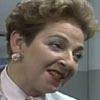 |
Of
the original cast of characters, which characters do you think
worked best?
My vote for the characters who worked best would go to Helen
Daniels, Jim Robinson, Des and Daphne Clarke - with a special
mention for Des’s interfering mother Eileen Clarke, played
brilliantly by the late actress Myra De Groot. I was never
completely comfortable with the character of Max Ramsay, as
his ocker accent seemed strangely at odds with that of his
friend and neighbour Jim Robinson. After all, the two had
supposedly been to school together. And the original Scott
Robinson, played by Darius Perkins, didn’t have the same impact
as Jason Donovan when he took over the role and made it his
own.
As
the show approached its demise on Channel Seven, it took a
more dramatic turn with the gripping Terry/Charles Durham
plot culminating in Terry shooting Paul. Was it always intended
to work out that way, or did this plot development occur to
wrap up the series?
My memory is that it was part of a number of plots designed
to wrap up the series on Channel Seven and take it out on
a strong note. My personal view, looking back, is that the
Terry murder story was perhaps out of character with the family
theme of the show.
What
do you think went wrong for Neighbours on Channel Seven?
The timeslot. Neighbours was originally designed for
6 pm, but then Seven decided to change the time of its news
session and moved Neighbours back half an hour to 5.30
pm. The change was critical, as it was now slap-bang in the
middle of game show territory.
Take
us through the move to Channel Ten...
Ian Holmes, managing director of Grundys, sold the idea to
Channel Ten... thus making television history for Neighbours
as the first show to be dropped by one network and picked
up by another. I had them moved on to Sons and Daughters.
I was buying lunch at the sandwich shop across the street
when I ran into Reg Watson who told me the news, and asked
if I’d like to return to it.
A
number of changes were made to the series on Ten - new characters
such as Madge, Mike, Clive, Zoe and Charlene were introduced,
Darius Perkins was replaced in the role of Scott by Jason
Donovan, ‘Ramsay Street’ was extended to include more houses
and the Lassiter’s complex became a prime location. How important
do you think each of these changes were to the show’s eventual
success on Ten?
Very important. The Lassiter’s complex opened up Neighbours
and gave us many more opportunities for stories. The addition
of Madge, Charlene, Henry, Mike, Jane and Clive gave the show
tremendous appeal for young viewers. Incidentally, Mitchell
wasn’t the original name for Madge’s family. Reg had chosen
Emery - with his quirky sense of humour, he liked the sound
of a character called ‘Henry Emery’. But about this time,
the English comic Dick Emery died, so as a mark of a respect,
Reg decided to change the name to Mitchell. ‘Henry’ was Reg’s
invention. I chose the name ‘Charlene’ as I felt it was a
uniquely Australian-sounding name similar to Raeleen, a very
popular character in an earlier Grundy show, The Restless
Years.
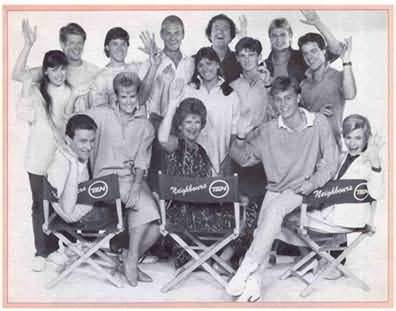
Not
long after the Channel Ten episodes were underway, Francis
Bell departed the series suddenly and one of the leading original
characters, Max Ramsay, needed to be hurriedly written out.
How did this affect the production of the show?
Oddly enough, Max Ramsay being written out didn’t seem to
affect the show at all. Good writers can always work around situations like this,
and his shadow was still looming over Ramsay Street in the person
of his sister Madge - who changed her name back to Ramsay after her divorce
from her erring husband Fred.
When
did you begin to realise the enormous impact the love affair
of Scott and Charlene was having on viewers?
Almost immediately. Kylie Minogue and Jason Donovan had a
lot of on-screen charisma and chemistry. They seemed to be right for each other. Incidentally, we had endless discussions at the time among
our story team on how far we should go in terms of a sexual relationship, and
whether sixteen was too young to be thinking of marriage. Remember, there
were a number of restrictions in those days on what could be shown or implied
in an early timeslot when children were watching. But Scott and Charlene
were a super-charged duo from the beginning.
Daphne
Clarke holds a special place in the show’s history as being
the first central character to be killed off. What impact
do you think this - and indeed, subsequent deaths - had on
the show?
Difficult to say what impact Daphne’s death had on the show,
except that story editors are always reluctant to kill off good characters.
Killing off a TV character is so final, and almost impossible to reverse.
I remember it was done once in the famous American TV series Dallas in which
the character’s death turned out to be only a dream. Another way
out is to bring back the character as his/her twin. The ‘death’ of Harold
was a tricky one, as we didn’t want to lose the character. He had apparently
died from drowning, but the writers cleverly arranged it so his body
was never washed up or discovered. He later returned to the show - with amnesia.
Re-casting
was a more frequent option in the old days of the series -
what are your feelings on re-casting?
I think we had three Lucy’s (or was it four?) over time. I
don’t have any particular view on re-casting. Sometimes it works, sometimes
it doesn’t.
Working
on the show at the height of its success in the late 1980s
must have been an amazing experience - can you share with
us some of your memories of being involved in the ‘Neighbours
Mania’ of the time?
Yes, it was an amazing experience. By this time, we had a
terrific team of storyliners working on the show, very creative, very hardworking
and enthusiastic, with Ray Kolle as Story Editor. Ray was a superb
editor, with an almost uncanny knack of being able to come up with the
right story and the right character just when needed. As well as counting
him as a friend, I also regard him as one of the outstanding editors in the business.
Incidentally, let me throw in an anecdote here concerning
Jason Herbison, who has own place on the Neighbours
website (and thanks, Jason, for those kind words about me!).
Our first contact with Jason was when Ray began getting letters
from a teenage schoolboy who’d set himself up as an unofficial
critic of the show. Ray would come out from his office (sometimes
amused, occasionally irritated) and read them out to us. Jason
was a tough critic, but very fair and perceptive. When Jason
left school, he was offered a job as a trainee storyliner,
and as the saying goes, the rest is history.
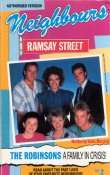 |
In
1988, you wrote two prequel novels, “The Ramsays: A Family
Divided” and “The Robinsons: A Family In Crisis” with your
fellow Neighbours colleague, Ray Kolle. Can you tell
us a little about that? Where there ever plans to do more
books?
The idea for the two Neighbours books was based on
a prequel that had been written for the English TV show EastEnders.
The one on the Ramsays was written with the help of Ray Kolle,
structuring the story. I then wrote one on the Robinson family.
And no, there were no plans to do more books, although we’d
have been happy to write any. Trouble is, no one asked us.
Who
have been your favourite characters over the years, and why?
My favourite characters are Helen, Des Clarke, Clive, Madge,
Charlene, Scott, Henry, Harold Bishop, Lou Carpenter and Mrs. Mangel,
whom one of our storyliners claimed was modelled on her mother-in-law. And
of course, Bouncer. Everyone loved Bouncer, he was almost as clever as
Skippy the kangaroo. It was a sad day for us when he had to be retired
through illness. The only story for him I found difficult to accept was when
Bouncer once dreamed of his own wedding. Do dogs have romantic dreams?
And if so, do they dream in colour?
Did
you have any favourite storylines? And were there ever any
storylines that you didn’t like?
Too many favourite storylines to list, although Charlene and
Scott’s marriage would come close. While we were sitting around
a table planning the episodes for it, Reg Watson came into
the room and said he wanted Charlene to have a ‘Cinderella
dress’ for her wedding. This then gave us the opportunity
for a story with Henry working after hours to buy his sister
a dress she had admired in a shop window, but couldn’t afford.
Story ideas come from everywhere. For my unfavourite, see
above - Bouncer‘s dream.
Did
you have a favourite era of the show?
No. I loved all of them. Which makes me a very uncritical
viewer, doesn’t it?
When
hugely popular characters such as Charlene, Scott and Henry
left the series, did you think their exits would effect the
show’s popularity? How did you go about tackling their departures,
in terms of writing them out, bringing in new characters etc?
I wasn’t with Neighbours for the entire time I was
at Grundy’s, sometimes I was working on other shows, so can’t
answer this.. except to say that no character, however popular,
is irreplaceable (something actors often find out to their
regret). And a clever Story Editor - such as we had in Ray
Kolle - can always think of something or someone to fill the
gap.
Mrs.
Mangel’s departure was a huge loss to the series in that Ramsay
Street lost its resident nosey neighbour. Do you think anyone
could have filled the void left by her?
Nobody could fill the void left by Mrs. Mangel. She was a
one off.
How
important do you think the core, long serving characters such
as Helen, Jim, Paul, Madge etc, were to Neighbours?
Very important. They were the foundation on which Neighbours
was built. If there’s one thing that saddens me about Neighbours
today is that we’ve lost all those wonderful characters who
made up the original families in the street... the Robinsons,
the Clarkes and the Ramsays. And I’m not sure they’ve been
successfully replaced.
What
was the most rewarding aspect of working on Neighbours?
Most rewarding? Seeing what you’ve created as a storyliner
or script writer eventually shown on screen. And realising
it worked.
What
have you done since leaving Neighbours?
Moped around wishing I were with Neighbours again.
No, seriously, I have been studying for an Honours degree
in English Literature.. which is a strange kind of thing for
a television writer to do, but I’ve enjoyed it. Graduated
in April 2003 with cap and gown.
Do
you still watch the show now? If so, what do you think of
it? Do you think it’s changed a lot since your days at the
helm?
I watch Neighbours occasionally. It’s still an excellent
show, but it’s not the same Neighbours as the one I
worked on. Less emphasis on family values, more emphasis on
teenage characters and their complicated love lives. But I’m
happy to see Harold and Lou are still in it. Someone should
create a show around those two. It would have to be a sitcom,
of course.
What
do you think is the reason for the huge success Neighbours
has enjoyed for the past 19 years?
Good stories. Strong and well written characters. And most
of all, a sense of fun and humour. Which is how I came into
Neighbours in the first place.
Interview by Mark. Added on 27th March 2004
Back
|

